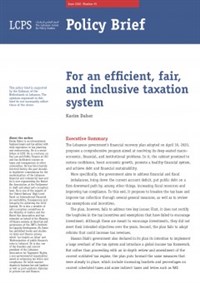Fiscal & Budget
Jun 01, 2021
For an Efficient, Fair, and Inclusive Taxation System

The Lebanese government’s financial recovery plan adopted on April 30, 2020, proposes a comprehensive program aimed at resolving its deep-seated macroeconomic, financial, and institutional problems. In it, the cabinet promised to restore confidence, boost economic growth, promote a healthy financial system, and achieve debt and financial sustainability.
More specifically, the government aims to address financial and fiscal imbalances, bring down the current account deficit, put public debt on a firm downward path by, among other things, increasing fiscal resources and improving tax compliance. To this end, it proposes to broaden the tax base and improve tax collection through several general measures, as well as to review tax exemptions and incentives.
The plan, however, fails to address two key issues: First, it does not rectify the loopholes in the tax incentives and exemptions that have failed to encourage investment. Although these are meant to encourage investments, they did not meet their intended objectives over the years. Second, the plan fails to adopt reforms that could increase tax revenues.
Hassan Diab’s government also declared in its plan its intention to implement a large overhaul of the tax system and introduce a global income tax framework. But rather than proceeding with an in-depth review and amendment of the current outdated tax regime, the plan puts forward the same measures that were already in place, which include increasing brackets and percentages on current scheduled taxes and some indirect taxes and levies such as VAT.
 The Lebanese government’s financial recovery plan adopted on April 30, 2020, proposes a comprehensive program aimed at resolving its deep-seated macroeconomic, financial, and institutional problems. In it, the cabinet promised to restore confidence, boost economic growth, promote a healthy financial system, and achieve debt and financial sustainability.
The Lebanese government’s financial recovery plan adopted on April 30, 2020, proposes a comprehensive program aimed at resolving its deep-seated macroeconomic, financial, and institutional problems. In it, the cabinet promised to restore confidence, boost economic growth, promote a healthy financial system, and achieve debt and financial sustainability.